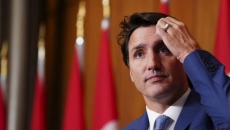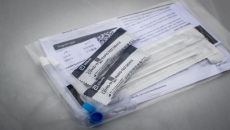OTTAWA - Labour Minister Seamus O'Regan says the Liberal government is planning legislation to make Canadian companies ensure that they are not using slave labour or exploiting child workers overseas.
In an interview, O’Regan said he is preparing a "comprehensive" bill that would require Canadian firms and government departments to scrutinize supply chains with the aim of protecting workers.
There is widespread support in Parliament, including among Liberal and New Democrat MPs, for such a law, he said.
The bill would make Canadian firms do due diligence to make sure none of their products or components are made in sweatshops that employ children or force people to work excessive hours for paltry pay.
O'Regan said the issue is a matter of "urgency," and he is looking at how to frame the legislation most effectively.
“There are two things that we are looking at: There should be some transparency requirements for business to report on supply chains. The other is more due diligence, demanding that they check."
The minister is closely examining the texts of four private members bills now before Parliament with similar aims. They include a bill originally introduced by Liberal MP John McKay that is now being shepherded by his colleague Marcus Powlowski.
The NDP has introduced two similar bills, and a private member's bill from Sen. Julie Miville-Dechene combating forced labour is currently progressing through Parliament.
O'Regan said he has not decided whether to introduce a stand-alone government bill or to adapt one of the existing efforts.
“We have four private members' bills. It’s an embarrassment of riches," he said. "So we have to take a close look at all of them."
McKay said he would be open to the government adopting or modifying the text of his bill.
O'Regan said there is backing within all parties for a law cleaning up supply chains.
“Members around the House are seized with the issue and I am very happy about that,” he added. "It is something that our caucus is really quite taken with."
The planned law, which follows a government consultation, would make sure that Canadian businesses operating abroad look at how their goods are produced and do not contribute to human rights abuses.
O’Regan was asked by Prime Minister Justin Trudeau to take the lead on the file upon being appointed labour minister after the summer election.
A report by the House of Commons international human rights subcommittee called on the government to incentivize businesses to thoroughly monitor their supply chains for the use of child and forced labour.
The report said that in 2016, 4.3 million children were involved in forced labour, a figure the International Labour Organization warned was an underestimate.
The committee report warned that child labour most often occurs at the lowest tiers of the supply chain out of the sight of buyers, inspectors and consumers. In South and Southeast Asia children have been found making clothes, fishing and processing seafood.
The report found child labour interferes with young peoples' education and can involve work in hazardous conditions, including with toxic substances or at extreme temperatures.
It can also include confinement at work sites and indentured labour, where whole families are forced to work to repay debts.
Rocio Domingo Ramos, business and human rights policy and research officer at Anti-Slavery International, said Canada is lagging behind countries such as Britain, France, Germany and Norway, which have already introduced laws making companies ensure their products are not made using forced labour.
The group has seen the emergence of laws that would not only prevent exploitation but "crucially, enable victims of these abuses to access justice,” she said.
In 2020, the Canadian government prohibited importation of goods produced by forced labour under the customs tariff.
The new law is expected to require Canadian companies and federal departments to report each year on measures taken to prevent and reduce the risk that forced labour or child labour is used by them or in their supply chains.
It would also likely include an inspection regime and give the minister power to demand evidence.
In February, a group of parliamentarians and former parliamentarians wrote to Finance Minister Chrystia Freeland calling for the introduction of a modern slavery act that could regulate pension-fund investments.
That followed a report by Hong Kong Watch alleging that a number of pension funds have investments in firms involved in China's Xinjiang region, where the Uyghur people have been detained in camps.
New Democrat MP Peter Julian, who introduced one of the private bills, said a government law is “long past overdue.”
“The reality is that if Canadians knew what some Canadian corporations are doing abroad they would be absolutely appalled at their systematic violation of human rights."






